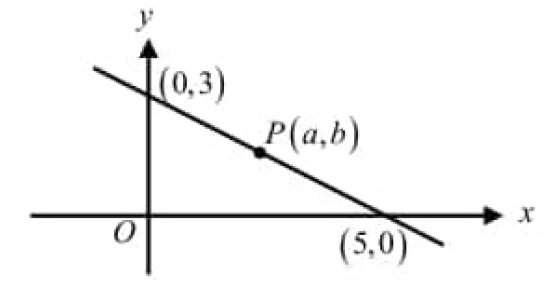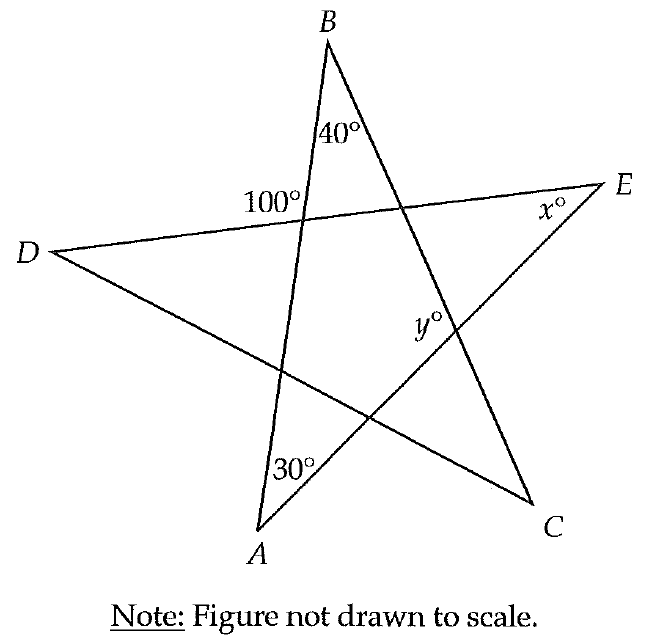PROBLEMS ON SQUARES AND SQUARE ROOTS
Problem 1 :
Write the first five square numbers.
Solution :
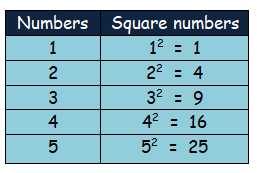
So, the first five square numbers are 1, 4, 9, 16, 25
Problem 2 :
The Square of 5.5 is
Solution :
(5.5)2 = (5.5) × (5.5)
= 30.25
Problem 3 :
The Square of 0.7 is
Solution :
(0.7)2 = (0.7) × (0.7)
= 0.49
Problem 4 :
The Square of 500 will have ----------- zeroes.
Solution :
(500)2 = (500) × (500)
= 250000
So, the Square of 500 has 4 zeroes.
Problem 5 :
The Square root of 24025 will have --------- digits.
Solution :
Given, 24025
Number of digits = 5 (odd) = n
Number of digits in the Square root = (n + 1)/2
= (5 + 1)/2
= 6/2
= 3
So, The Square root of 24025 has 3 digits.
Problem 6 :
Show that 500 is not a perfect square
Solution :
Using prime factorization method :

500 = √(5 × 5 × 5 × 2 × 2)
Since there are not grouped in identical pairs, 500 is not a perfect square.
Problem 7 :
The digit at the ones place of 572 is
Solution :
572 = 57 x 57
= 3249
So, the digit at the ones place of 572 is 9.
Problem 8 :
There are ------- perfect squares between 1 and 100.
Solution :
|
12 = 1 22 = 4 32 = 9 42 = 16 52 = 25 |
62 = 36 72 = 49 82 = 64 92 = 81 102 = 100 |
The perfect squares between 1 and 100 is 4, 9, 16, 25, 36, 49, 64, and 81.
So, there are 8 perfect squares between 1 and 100.
Problem 9 :
The units digit in the square of 1294 is
Solution :
By using the property of square numbers,
If a number has 4 or 6 in the unit's place then its square ends in 6.
1294 = 42 = 16
So, the units digit in the square of 1294 is always end with 6.
Problem 10 :
Check whether 90 is a perfect square or not by using prime factorization.
Solution :
Using prime factorization method :
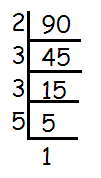
90 = √(2 × 3 × 3 × 5)
Since there are not grouped in identical pairs, 90 is not a perfect square.
Problem 11 :
Using prime factorization, find the square roots of 11025
Solution :
Decompose 11025 into prime factors using synthetic division.
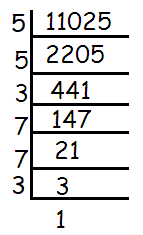
The square root of 11025 = √(5 × 5 × 3 × 7 × 7 × 3)
Inside the radical sign, if the same number is repeated twice, take one number out of the radical sign.
= 5 × 3 × 7
= 105
So, the square root of 11025 is 105.
Problem 12 :
Using prime factorization, find the square roots of 4761
Solution :
Decompose 4761 into prime factors using synthetic division.
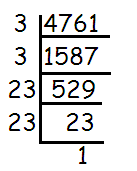
The square root of 4761 = √(3 × 3 × 23 × 23)
Inside the radical sign, if the same number is repeated twice, take one number out of the radical sign.
= 3 × 23
= 69
So, the square root of 4761 is 69.
Problem 13 :
Find the least number of four digits that is a perfect square.
Solution :
The least number of four digits is 1000.
Using Long Division Method :
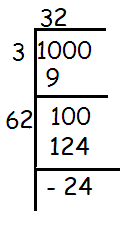
(32)2 is more than 1000 by 24.
So, the least number to be added to 1000 is 24.
1000 + 24 = 1024
Therefore, the smallest four digit perfect square number is 1024.
Problem 14 :
Find the greatest number of three digits that is a perfect square.
Solution :
The Greatest number of three digits is 999.
Using Long Division Method :
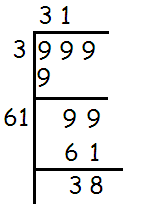
Since 999 is not a perfect square, now to find the largest 3 digits perfect square number subtract 38 from 999.
Required number = 999 - 38
= 961
So, the greatest three digit perfect square number is 961.
Problem 15 :
Find the smallest perfect square divisible by 3, 4, 5 and 6.
Solution :
We are taking the Least Common Multiple of 3, 4, 5 and 6
LCM of (3, 4, 5, 6) = 2 × 2 × 3 × 5
LCM = 60
Since 3 and 5 are not identical pairs, we should multiple 3 and 5 by 60.
That is,
= 60 × 3 × 5
= 900
So, the required perfect square is 900
Problem 16 :
A number is 64 times of the square of its reciprocal. The number is :
a) 10 b) 4 c) 2 d) 16
Solution :
Let the required number be x. Its reciprocal will be 1/x.
A number = 64 times of the square of its reciprocal. So,
x = 64 (1/x2)
x3 = 64
x3 = 43
x = 4
So, the required number is 4. Option b is correct.
Problem 17 :
The smallest perfect square number exactly divisible by 4, 5, 6, 15, 18 is
a) 800 b) 225 c) 361 d) 900
Solution :
Prime factors of 800 :
= 25 x 52
Here 2, 5, 10, 8, 20, ...... these are factors, since in this we cannot see 6 and 15 as factors. Then the required number is not 800.
Prime factors of 225 :
= 32 x 52
3, 9, 15, 25, ........ are the factors but 18 and 4 are not factors. Then, the required number is not 225.
Prime factors of 361 :
= 19 x 19
From this, the required number is not 361.
Prime factors of 900 :
= 32 x 22 x 52
From this, it is clear that 4, 5, 6, 15, 18 are factors. Then the required number is 900.
Problem 18 :
A gardener plants 17956 trees in such a way that there are as many rows as there are trees in each row. The number of trees in a row are
a) 136 b) 164 c) 134 d) 166
Solution :
Let x be the number of rows and x be the number of columns.
Total number of trees = x2
x2 = 17956
x = √134 x 134
x = 134
So, there are 134 trees in each row and 134 rows are there.
Kindly mail your feedback to v4formath@gmail.com
We always appreciate your feedback.
©All rights reserved. onlinemath4all.com
Recent Articles
-
Digital SAT Math Problems and Solutions (Part - 134)
Apr 02, 25 12:40 AM
Digital SAT Math Problems and Solutions (Part - 134) -
SAT Math Resources (Videos, Concepts, Worksheets and More)
Apr 02, 25 12:35 AM
SAT Math Resources (Videos, Concepts, Worksheets and More) -
Digital SAT Math Problems and Solutions (Part 135)
Apr 02, 25 12:32 AM
Digital SAT Math Problems and Solutions (Part 135)
